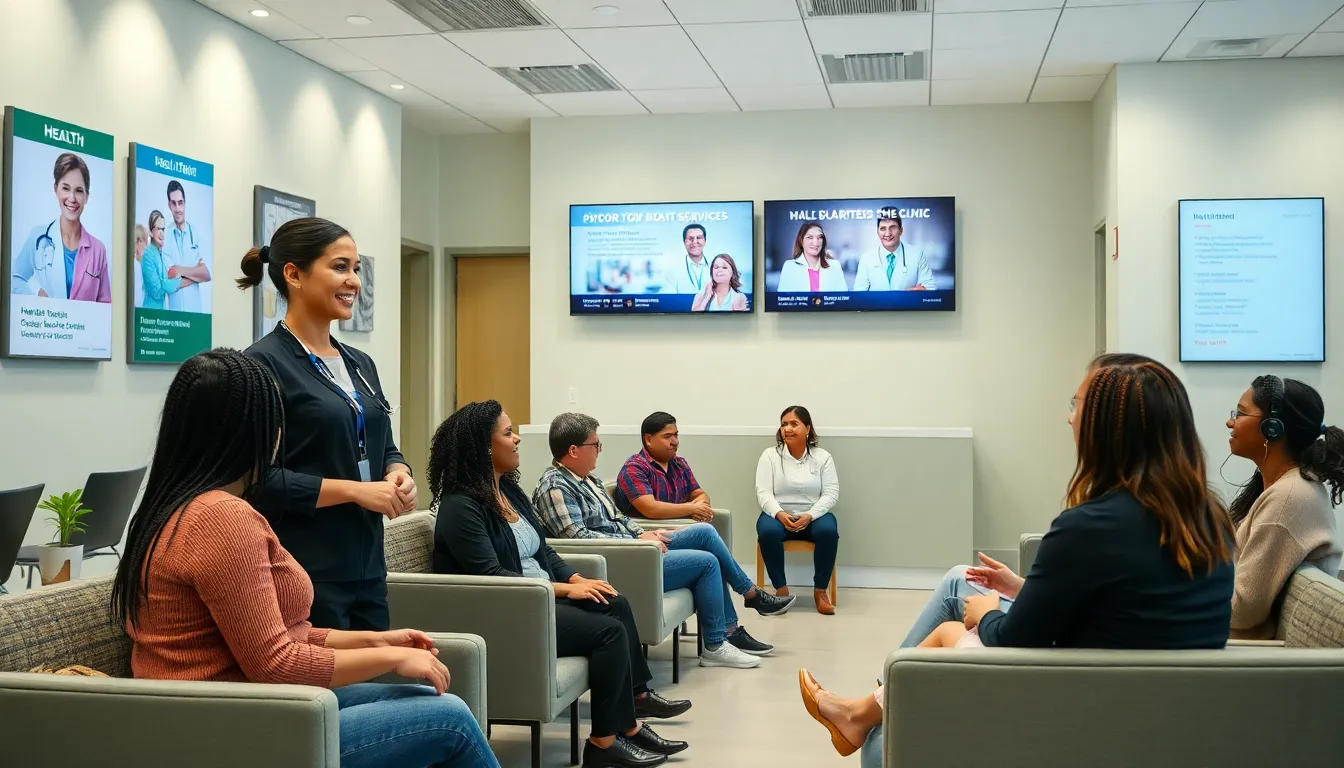Imagine a world where both women and men can stroll into a health clinic without feeling like they’ve stepped onto the set of a horror film. That’s right, no awkward waiting rooms, nothing resembling a scene from an old sitcom. Welcome to the Women and Men Health Clinic, where a commitment to healthcare that acknowledges everyone’s unique needs reigns supreme. In this text, we’ll jump into the heart of these clinics, showcasing the vital role they play in ensuring optimal health for all. It’s time to understand why specialized health services are more important than ever and how they tackle the quirks and challenges of modern healthcare.
Table of Contents
ToggleOverview Of Health Clinics

Health clinics serve as the cornerstone of preventative health care. These facilities might seem like places you only visit when you’ve got the sniffles, but they offer so much more.
The landscape of health clinics has evolved tremendously over the years. Gone are the days when healthcare meant solely addressing illnesses. Clinics today are dedicated to fostering health through a holistic approach. They aim not just to treat, but to prevent. Health clinics come in various shapes and sizes, focusing on different populations, some target specific age groups, while others cater to unique health needs. Whether it’s a family practice or a specialized women and men health clinic, the goal remains the same: ensuring quality healthcare that adapts to diverse needs.
That’s where health clinics like the Women and Men Health Clinic step in, bridging gaps in care and knowledge, ensuring that every individual feels seen and heard.
Importance Of Specialized Health Services
Let’s face it: men and women have different health needs. From hormonal changes to reproductive health, understanding these needs is fundamental for delivering effective healthcare. Specialized services are crucial because they address specific health risks and give an extra layer of reassurance.
Consider this: women often face unique challenges, especially concerning reproductive health, prenatal care, and menopause. On the flip side, men grapple with prostate health, testosterone levels, and heart disease preventive measures. Offering tailored services helps mitigate risk factors, resulting in healthier individuals overall.
Besides, specialized clinics foster an environment where patients feel more comfortable discussing sensitive issues. This supportive atmosphere is key, patients are more likely to seek help when they know their concerns will be acknowledged and treated with care.
Services Offered at Women And Men Health Clinics
At women and men health clinics, the services offered are as varied as the individuals they serve. Let’s break it down:
Preventive Care For Women
Women’s preventive care appointments might include routine screenings like mammograms and Pap smears. Regular check-ups help catch any potential issues early on. Besides, prenatal and postnatal care are also integral to ensuring the health of both mother and child, providing support and guidance through significant life stages.
Preventive Care For Men
Men’s health is equally crucial, with services like PSA tests, cholesterol screenings, and cardiovascular assessments making regular appearances in men’s health plans. Preventive healthcare can also include discussions about lifestyle choices, offering a comprehensive strategy to combat issues like diabetes and hypertension.
Treatment Options Available
Once health issues arise, men and women health clinics don’t just take a step back. In fact, they take a proactive approach.
Treatment options range from standard medicine prescriptions to lifestyle counseling. Mental health services, including therapy and guidance, are also a crucial part of many clinics’ offerings. The focus isn’t solely on the physical aspect of health: mental well-being is paramount. Besides, integrative approaches are gaining traction. From acupuncture to nutritional advice, these clinics are at the forefront of combining traditional and modern treatment methods to provide holistic care.
Challenges Facing Health Clinics
Even though their best efforts, health clinics face several challenges in providing top-notch care. One major issue is access to services, particularly in underserved areas. Many clinics struggle to meet patient needs due to limited resources or staffing.
Also, there’s always the puzzle of patient engagement. Some people avoid regular check-ups, thinking they’re bulletproof. And then there’s the matter of keeping up with rapidly changing healthcare guidelines and technology. For health clinics to continue serving individuals adeptly, they must remain informed and adaptable.
Future Trends In Women And Men Health Clinics
Looking ahead, women and men health clinics are poised for exciting changes. Embracing technology can lead to significant advancements in patient care, including telehealth options, meaning you can get a consultation without even leaving your couch.
Also, there’s a growing emphasis on inclusivity in healthcare. Clinics are now more focused on providing services catering to LGBTQ+ individuals and non-binary patients, showing a commitment to understanding and addressing varied health needs. A future driven by precision medicine and personalized care will likely emerge, ensuring everyone receives tailored treatment based on genetics, lifestyle, and preferences.



